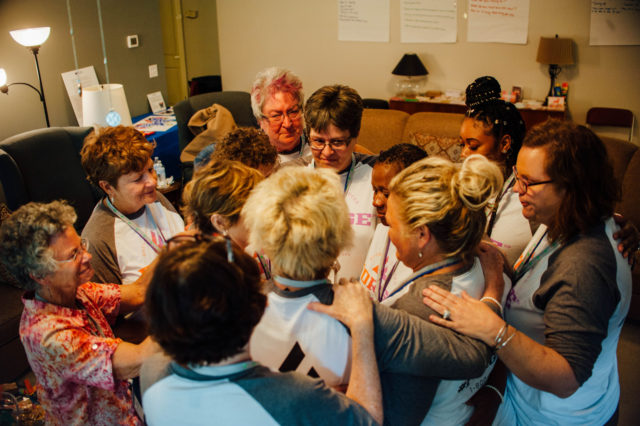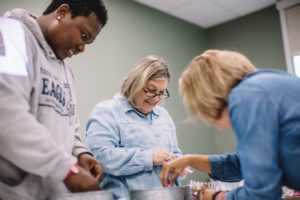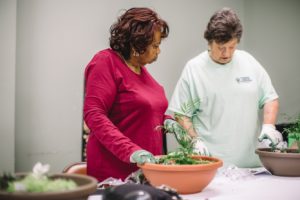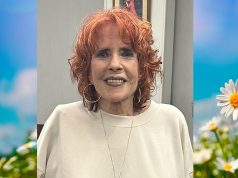
By Ariel Worthy
The Birmingham Times

For years, surviving cancer involved making it through treatment successfully and following up on doctor’s visits. Today, it involves much more than that, said Caroline McClain, manager of the Forge Breast Cancer Survivor Center.
“There’s been a lot more interest in keeping people healthy throughout the rest of their lives,” McClain said. “Two years ago, no one was talking about survivorship. Now, everyone is. That’s what’s exciting. We didn’t have anything to address the lifelong impact of cancer, and now we’re looking at it.”
Survivorship has become an important subject for those in the cancer community, and here’s how Forge defines it: “A look at your life from the day you are diagnosed through the rest of your life, and what the journey looks like,” said McClain.
“Not everyone wants to be called a survivor, so we’re careful at Forge not to use that [term]. It’s a look at the impact of your treatment or how your ‘new you’ looks after treatment or beating cancer.”
Survivorship focuses on what a person who has gone through cancer can and cannot do after treatment, McClain said. It’s a new way to stay healthy after beating a life-changing disease.
Forge is an organization that supports and encourages everyone touched by breast cancer, including “co-survivors,” loved ones and caregivers of those going through breast cancer. Survivorship is important because, even though someone beats cancer, he or she may have to consider other things, such as heart conditions or other side effects, McClain said.
Surviving Cancer

McClain explained that Forge was founded because people would make it through treatment and say, “‘I’m going home, and I don’t know how to do these things I used to do’—[things like] returning to exercise and nutritional changes … they should be aware of.
“A lot of people in remission may feel a pain somewhere and think, ‘Oh, my gosh, is my cancer back?’ … That amount of fear and anxiety [can arise] before going to see a doctor. It’s something that has an impact on you for the rest of your life.”
Being a Co-survivor
McClain knows firsthand what it’s like to have a loved one go through cancer. She recently lost an uncle due to the side effects of cancer. Forge was there for him.
McClain’s uncle, Hubert Green, was a famed golfer who died from complications after a radiation procedure for oral cancer. He was diagnosed in 2003 and in remission by the end of that year, but in early 2018 he had complications due to the cancer.
“He went in for a procedure due to a side effect of radiation, and it took his life,” McClain said of Green, who died in June of this year.
“You need someplace to call. You need someone who can provide information, who can show you what to do,” she said. “I wish I’d had something like Forge when we first started going through that process [in 2003].”
McClain’s uncle was hospitalized for nearly two months, and she was there with him. She would have loved being matched with someone to talk to about what she was experiencing as a co-survivor—which is part of what Forge, established in 2014, does.
“I would have been at ease knowing there was someone who cared about what was going on,” McClain said. “That would have provided so much comfort.”
When her uncle died earlier this year, Forge provided self-care resources to McClain: “Even though I was devoted to being there for him, I still had to take time for myself and not feel guilty about that,” she said. “If I didn’t take care of myself, I couldn’t be a caregiver for him.”
McClain said the team at Forge made sure she was doing well.
“It was as thoughtful as people saying, ‘Go home. Take a nap. … Go for a walk.’ Whatever it took to make sure I was the best I could be.”
Retreat
Another special part of Forge is its annual retreat, during which women with metastatic, or stage 4, breast cancer go for a

weekend to bond with family members: “This is something at the forefront of their minds.”
“We’re told that family members and loved ones don’t know how to [be supportive] because so many people are used to people surviving cancer and moving on,” McClain said.
The Forge retreat gives everyone a chance to talk through their worries, such as a survivor talking about the fear of dying.
“One woman talked about how she was afraid of leaving her 4-year-old daughter behind and how she was afraid of missing all of those important milestones,” McClain said. “One of the things she was taught to do was get a book she could use to write letters for milestones of her daughter’s life. She’d write a letter for when her daughter turned 21 or when she got married, [for instance], and put it in a special box that the person with her at the retreat would keep and present to her daughter.

“Another mother and daughter [at the retreat] didn’t really talk about what cancer would mean for the family’s future. We had them talk through those things.”
Forge retreat attendees also heard from a woman who has been living with metastatic breast cancer for 19 years.
“You don’t see that often,” McClain said. “[She explained] how she has handled her finances and her will; it was good to pass that [information] to women. She shared from a wisdom standpoint, but she also said, ‘You need to celebrate.’ She called it ‘putting on her princess.’ She would put on a crown and let people take care of her. She lets down those boundaries and goes to the spa or just celebrates life. She just lets people love on her.”
To learn more about the Forge Breast Cancer Survivor Center, call 205-838-6159, send an email to info@forgeon.org, or visit forgeon.org.
Click here to read more Breast Cancer stories: Coach Carol; Yogi Dada; Janet Ware; Eugenia Tartt; Tamika Lewis.



